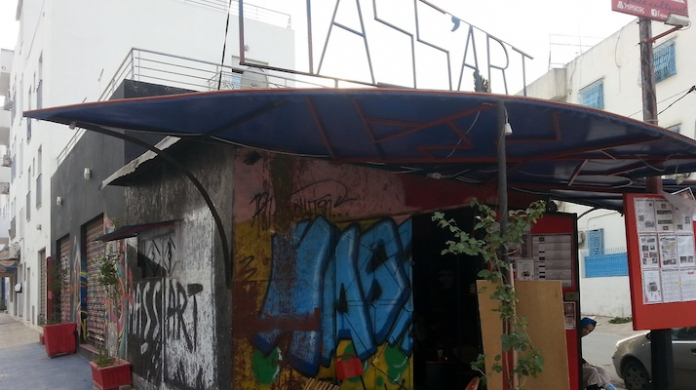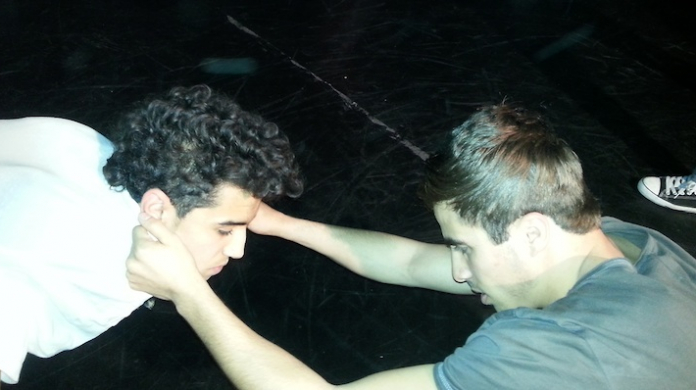Hakeem Onibudo travelled to Tunisia to see more than 100 B-boys compete and run a new kind of workshop
The future is bright
I begin this blog by saying I had no expectation. The project brief was clear but it was engulfed in an air of mystery in terms of the outcome…
On arrival in Tunis I had reservations and concerns over how the world of “battling”, being represented by the notorious UK Boy Champs, would transfer into my world and be relevant to my expertise. Art for me goes beyond trying to outdo a foe through dancing…
The event was held at Whatever Saloon in downtown Tunis, and from the outset I was very much impressed by the setting. The atmosphere was vibrant and my British Council colleague stayed in close proximity, to allow me to be drip fed the info needed in terms of main characters, set up and background history of the event, as well as partners and important features.
"Art for me goes beyond trying to out-do a foe through dancing…"
The pre-qualifier showcased the array of talent. More than 100 B-boys competed for only seven spots. The level was high, the determination fierce and you soon forget where you were in terms of geographical location. It was decided who would be joining the nine other B-boys in the main event later that night, and then I went back to the hotel for some rest…
On my return for the evening session, I noticed an increased vibe and atmosphere, more female faces and a fresh new air of anticipation. We were about to see arguably the best 16 B-boys from North Africa, representing Morocco, Tunisia, Algeria and Libya. Fast, frenetic and fresh, we eventually got down to the final where local hero Carbon from Tunisia was up against Amaro from Algeria. Amaro triumphed and will subsequently be coming to the UK B-boy finals in Birmingham, in October 2014.
The event ended with the crowd free styling and cyphering to the sounds of London DJ Renegade. It was interesting to see a packed house in the evening of approximately 300 people. Also noticeable was the strong female presence in the crowd. I was told that, pre-revolution, this would not have occurred. Indeed, this event would not have happened before 2011.
"A number of young people were pushed by their passion and what social media allowed them to watch"
Breakdancing, as well as all aspects of hip-hop culture, was banned during the Ben Ali regime in Tunisia. It was seen as an anti-establishment form of expression. Artists were looked at as coming from the wrong side of the tracks. The street didn’t belong to the population; no gatherings (and thus no street art) of any sort were allowed but those pro-regime or organised by it. Nevertheless, a number of young people were pushed by their passion and what social media allowed them to watch. They learned how to dance as soloists or in duets, as they used to practice in their houses in small rooms, not in cultural or sports centres where they couldn’t get in.
I took the time to sneak away from the event and have a quiet dinner on my own to reflect on what I had seen. The vibe I got from the B-boys was one of “this is what we want to do – battle”, so I could not help thinking back in my hotel room, "how am I going to crack this one and open up their minds to more possibilities?" I began to draw on my experience from Zimbabwe and ask myself what were the key factors in engaging with this region. To say I was nervous and apprehensive is an understatement.
Day 1
Mass'Art in itself proved to be a venue which for me summed up why I was far from home attempting to share my passion for the arts with these street B-boys. A small, purpose-built theatre in Tunis, this place had so much flavour, authenticity and character.
It’s funny because I am sure many people coming from “richer” countries with more facilities and resources for the arts would have been disappointed in the space, in terms of what they were used to. However I had come from places like Casablanca, where I worked with enthusiastic people despite large holes in the stage and intermittent splashes of water hitting your face from leaks in the ceiling, so this made no difference to me. Pacing up and down before the arrival of the B-boys, I remember saying to myself, "be you… people see through facades".
The workshop started with my introduction of who I was and why I was here… many understood my English but I still felt the need for there to be a translation into Arabic so that a clear message of what I wanted to accomplish was not diluted. I was told afterwards by members of Art Solution that a particular B-boy was not interested at the beginning, and actually uttered the word “bullsh*t”. On top of this, he was trying to influence his two friends to go out and do something else more interesting, like practice “power-moves”.
I progressed with my workshop, and two-and-a-half hours later, had succeeded in turning around the room and their attitudes. This was not because I am a super hero B-boy myself, but because I had empowered them to find their identity and express themselves through their own stories.
One B-boy, at the end of the session, said he had never done this before. He had just danced for dance's sake and focused on being the best at his moves. But to express themselves, and their individual characters and identities, through their passion, was actually something completely different to them all. We all went home and reflected.
Day 2
Everyone returned – not on time, but they all came back and we picked up from where we left off. The intensity heightened in the room and more was created. My “bullsh*t” friend came up to me and asked me for the correct spelling of my name so he could add me on Facebook…. Dare I say more?!
The words "North African super crew" were bandied about and a real bonding became apparent. It was no longer Tunisia against Algeria or Morocco versus Libya, but more of a how can we represent the MENA through our B-boy style. The dream of performing quality work in front of audiences became clear and the juggernaut had begun to gather momentum. The articulation of the Arab Spring suddenly had a new vehicle.
Day 3
We were reduced to six dancers because one Moroccan and the three Algerians had to leave to get back home. In a funny way, working with just six gave me more insight into their personalities, and their strengths against weaknesses. We created a three-minute piece in two hours and at the end they were almost crying at what they had achieved.
For me, I had proved to myself that Zimbabwe was no fluke. This had been a challenge but in a different way – the goals had been achieved.
The future is bright. The North African B-Boys are coming to a town near you real soon.
Hakeem Onibudo is a performer, choreographer/director, mentor, British Council Ambassador and Artistic Director of Impact Dance. He travelled to Tunisia with the British Council to run a workshop for street dancers and B-boys. Follow Hakeem on Twitter @hakeemonibudo and follow @UKTheatreDance for all of the latest news, opportunities and blogs from the British Council Theatre and Dance team.

